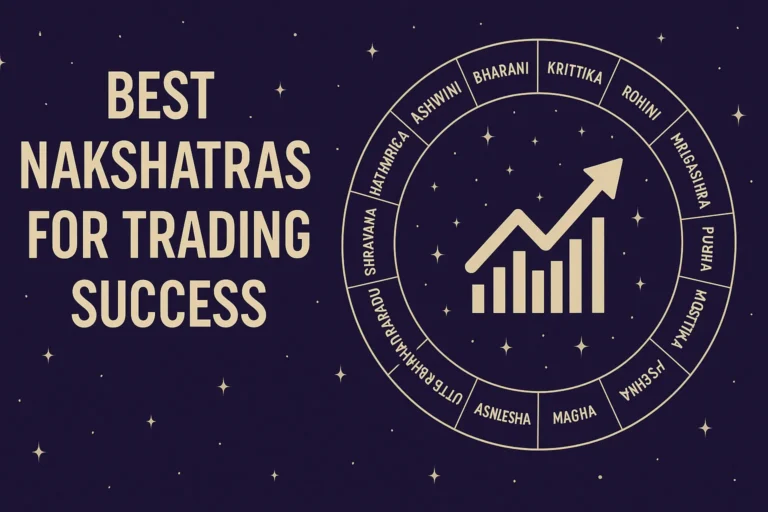Muhurat Trading in Indian Stock Market
Every year, the Indian stock market opens for a one-hour special trading session on Diwali, known as Muhurat Trading. This symbolic event is deeply rooted in Vedic astrology and Hindu tradition, where it’s believed that initiating financial activities during an auspicious planetary alignment brings long-term prosperity and luck.
In this article, we’ll explore the astrological foundation of Muhurat trading, why it matters, and how traders and investors can make the most of this rare event.
What Is Muhurat Trading?
Muhurat Trading is a ceremonial trading session held by the Bombay Stock Exchange (BSE) and National Stock Exchange (NSE) on Diwali, the festival of lights. It usually lasts for about one hour in the evening, and is viewed as a symbolic start to the new financial year (Samvat).
Many traders, especially in India, make token purchases during this time to mark the beginning of profitable trading for the year ahead.
Vedic Astrology Behind Muhurat Trading
The word Muhurat means “auspicious timing” in Sanskrit. In Vedic astrology, certain planetary alignments and lunar conditions are considered extremely favorable for new ventures.
On Diwali evening:
- The Moon is often in a strong Nakshatra such as Pushya, Anuradha, or Rohini.
- Venus or Jupiter is well-placed, indicating prosperity and success.
- The Tithi (lunar day) is either Amavasya or Pratipada, marking a powerful energy shift.
This alignment is said to invite Lakshmi (Goddess of Wealth) into one’s financial life.
Why Muhurat Trading Is Considered Auspicious
- Astrological Favorability:
The timing is selected by priests and astrologers after careful Panchang (calendar) analysis. - Tradition of Wealth Initiation:
Business communities start new account books (Chopda Pujan) and conduct trades during this hour to bless their finances. - Positive Market Sentiment:
Due to symbolic optimism, markets usually close in green, regardless of broader conditions. - Retail & Institutional Participation:
Both small investors and big houses participate, believing it sets the tone for the coming Samvat.
How Traders Can Prepare for Muhurat Trading
- Select Stocks in Advance:
Avoid impulsive buying. Choose fundamentally strong stocks or add to long-term holdings. - Stick to Token Positions:
Focus on symbolic trades rather than large-volume positions unless you see a clear opportunity. - Watch Market Sentiment:
Short-term price movements can be exaggerated due to low volumes and emotional buying. - Follow Your Zodiac-Based Strategy:
Use your Moon sign or Nakshatra to select sectors aligned with your energy (e.g., Virgo → Pharma, Leo → PSU stocks).
Muhurat Trading Trends and History
| Year | Nifty Closing | Sentiment |
|---|---|---|
| 2020 | +0.47% | Positive |
| 2021 | +0.49% | Positive |
| 2022 | +0.38% | Positive |
| 2023 | +0.56% | Positive |
Historically, Nifty and Sensex have ended Muhurat sessions in the green more than 80% of the time, showcasing collective optimism.
Conclusion
Muhurat Trading is more than a ritual—it’s a powerful combination of culture, astrology, and optimism. Whether you’re a seasoned trader or a beginner, participating in this session connects you with a centuries-old tradition of beginning new financial journeys on the right foot.
By aligning with the favorable planetary energies during Diwali, traders seek not just profits—but blessings and long-term growth.
FAQs
1. When is Muhurat Trading held?
It is conducted on Diwali evening each year, and the timing is announced by BSE and NSE a few days in advance.
2. What kind of trades are done during Muhurat Trading?
Mostly symbolic trades, small token purchases, or long-term positional entries.
3. Is Muhurat Trading profitable?
It’s not meant for profit-taking. It’s a ritual and psychological reset for the new Samvat.
4. Can I buy mutual funds during Muhurat Trading?
Yes, though most traders prefer equity trades for symbolic participation.
5. Should technical or astro signals be used for Muhurat trades?
Astrological timing is favorable by default. Still, apply basic logic and choose quality stocks.


